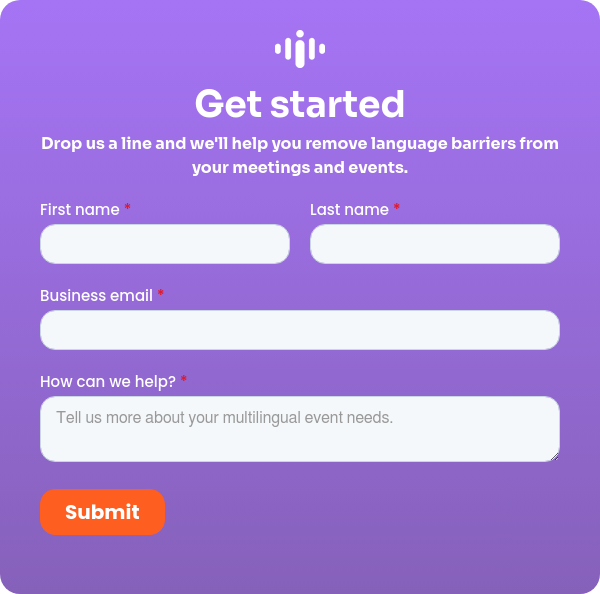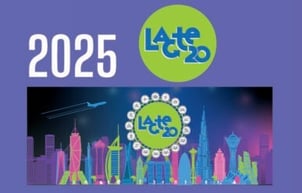Medical innovation thrives on multinational collaboration and knowledge sharing. Within the medical and pharma industry, multilingual events play a key role in facilitating conversations, enhancing scientific knowledge, and fostering partnerships between industry players.
As global events, language accuracy is vital for accommodating a diverse range of stakeholders including researchers, scientists, healthcare professionals, investors, and regulatory authorities. At the same time, inaccurate translation of technical and scientific terms creates an event experience that is as frustrating for the speaker as it is for the audience. Even worse, translation issues can lead to miscommunication, potentially leaving event attendees misinformed on the latest developments. Within such a stringently regulated industry, this can have severe legal implications. Especially as multilingual events are essential for ensuring compliance with local regulations, as well as facilitating effective communication between regulators and industry professionals across different countries.
In this article, we briefly unpack the challenges and benefits of hosting multilingual events before exploring steps that pharma and life science companies can take to source the right language interpretation solution. One that leads to successful, stress-free, and accurate multilingual events.
What are the challenges and benefits of organising accurate multilingual events?
Organising accurate multilingual events presents challenges. But the benefits far outweigh the effort required. With that in mind, here are some challenges and benefits to consider.
Challenges
- Language complexity — the pharma and life science industry uses complex scientific and medical terminology. Specialised knowledge is required for accurate interpretation and translation.
- Interpreter availability — finding professional interpreters with subject matter expertise and proficiency in the required languages can be challenging, especially for niche scientific fields.
- Technical considerations — setting up interpretation equipment, such as booths, headsets, and audio systems, requires careful planning and coordination to ensure smooth operation. To avoid technical issues, interpreters also need to be adequately onboarded on using your setup.
Benefits
- Improved event communication — accurate multilingual events facilitate clear and effective communication among participants, eliminating misunderstandings and nurturing collaboration.
- Enhanced engagement — by providing language access, multilingual events engage a broader audience, increasing participation and knowledge sharing.
- Cultural sensitivity — recognising and accommodating diverse languages and cultures demonstrates respect and inclusivity, strengthening relationships with stakeholders from different regions.
- Competitive advantage — successfully organising accurate multilingual events helps you gain a competitive edge over similar events that lack multilingual support. Additionally, these events are an opportunity to engage global stakeholders, expand your network, and keep pace with international developments.
8 Tips for ensuring accuracy in medical multilingual events
1. Use a Language Service Provider (LSP) with qualified interpreters
Your LSP should draw from a pool of qualified, trained interpreters. These professionals should possess in-depth knowledge of the industry and be adept at handling complex scientific and medical terminology. By screening interpreters and securing candidates with expertise in relevant fields, your LSP will help ensure accurate and high-quality interpretation for their events.
2. Improve understanding by adding technology like automated captions
Incorporating captions can significantly enhance understanding during multilingual events. Captions provide an extra layer of support by displaying the speech in writing in real time, ensuring participants can follow along even more effectively. Captions also make events more accessible for attendees who are hard of hearing.
3. Partner with a strong provider who provides end-to-end support
Organising language interpretation is a complex task that involves securing and managing interpreters and the technology required to enable interpretation. The right partner provides a fully one-stop-shop solution, including interpreter sourcing, technology provider, project management and day-of-event support. Additionally, your partner should have experience dealing with the specific needs of pharma and life science companies.
4. Choose a company with top-quality interpretation and captioning technology
When selecting a language solution, your partner should use the best captioning and interpretation technology available. If interpretation is provided remotely, for instance, then the platform used must guarantee smooth language transmission, with captioning technology that prioritises accuracy. Modern Automated Speech Recognition (ASR) offered by leading language solutions providers, for instance, can produce captions that achieve a consistent accuracy of up to 98% for several languages.
Of course, every event is different. Some events require language interpretation while others benefit from only sourcing captions. For some, the best approach is to combine multiple language solutions. Along with top-quality technology, your provider should also provide for whatever your event requires. Adaptability is as important as technology when organising successful multilingual events.
5. If an AI solution is used, ensure the AI uses a glossary
AI-powered solutions might be a viable alternative to traditional interpretation in some cases. To increase the accuracy of AI interpretation and translation, ensure your AI solution is enhanced to recognise your most important terms. The right AI-powered solution provider would benchmark all AI engines to offer the best one for your language combination and enhance it with a glossary function. The glossary is a customisable list of terms, expressions, and acronyms specific to the medical industry. AI relies on the glossary to ensure consistent and accurate translation.
6. Brief interpreters and set them up for success
To ensure interpreters are well-prepared for multilingual events, it is essential to brief them adequately and provide relevant information in advance. As this adds to your time and administrative burden, ideally your interpretation partner will ensure interpreters are fully briefed.
7. Provide speakers with guidelines for effective multilingual presentations
We’re not all natural-born orators. Giving speakers guidelines on preparing for presentations will help improve their accuracy. Best practices include:
- Tailoring content to the target language. This ensures the content flows naturally and avoids awkward phrasing or incorrect translations.
- Simplifying language and sentence structure and avoiding complex vocabulary and lengthy sentences. This will make it easier for interpreters and audience members to understand key points.
- Organising visual aids to enhance understanding, regardless of language barriers. Visuals should complement what is said and be easy to interpret.
- Urge speakers to practice presentations multiple times to ensure smooth and confident delivery. Through rehearsal, speakers are able to identify and address issues before they arise.
- If necessary, provide speakers with reference materials like terminology guides to help them accurately convey specific materials. These guides can be shared with interpreters to minimise ambiguity. This aligns with the tip.
- Ask speakers to consider getting input from language specialists, who can provide insights on fine-tuning content to guarantee that messaging is accurate and culturally appropriate.
8. Encourage presenters to speak clearly and at a moderate pace
Speakers should be encouraged to maintain a moderate pace and use clear language during their presentations. This practice significantly enhances participants' understanding and helps language interpreters to both keep pace with the speaker and to deliver interpretation with greater accuracy.
Useful resource:
Video: Tips for speakers with remote simultaneous interpretation
Securing the ideal language interpretation provider
Accurate language interpretation and translation are crucial for the success of pharma and life science events. By following these top tips, companies can ensure the quality and accuracy of interpretation, fostering seamless communication and collaboration. Of course, the success of multilingual events depends on the strength and reliability of your language solutions provider.
At Interprefy, we provide a host of high-quality and accurate language solutions including remote simultaneous interpretation, AI-translated speech and captioning, and traditional live translation and captioning. With a strong history of working with pharma and life sciences companies, we can source trusted interpreters who specialize in the medical industry.





 More download links
More download links



